‘They thought I was so low’: Women say they were harassed, bullied, ignored at powerful water agency
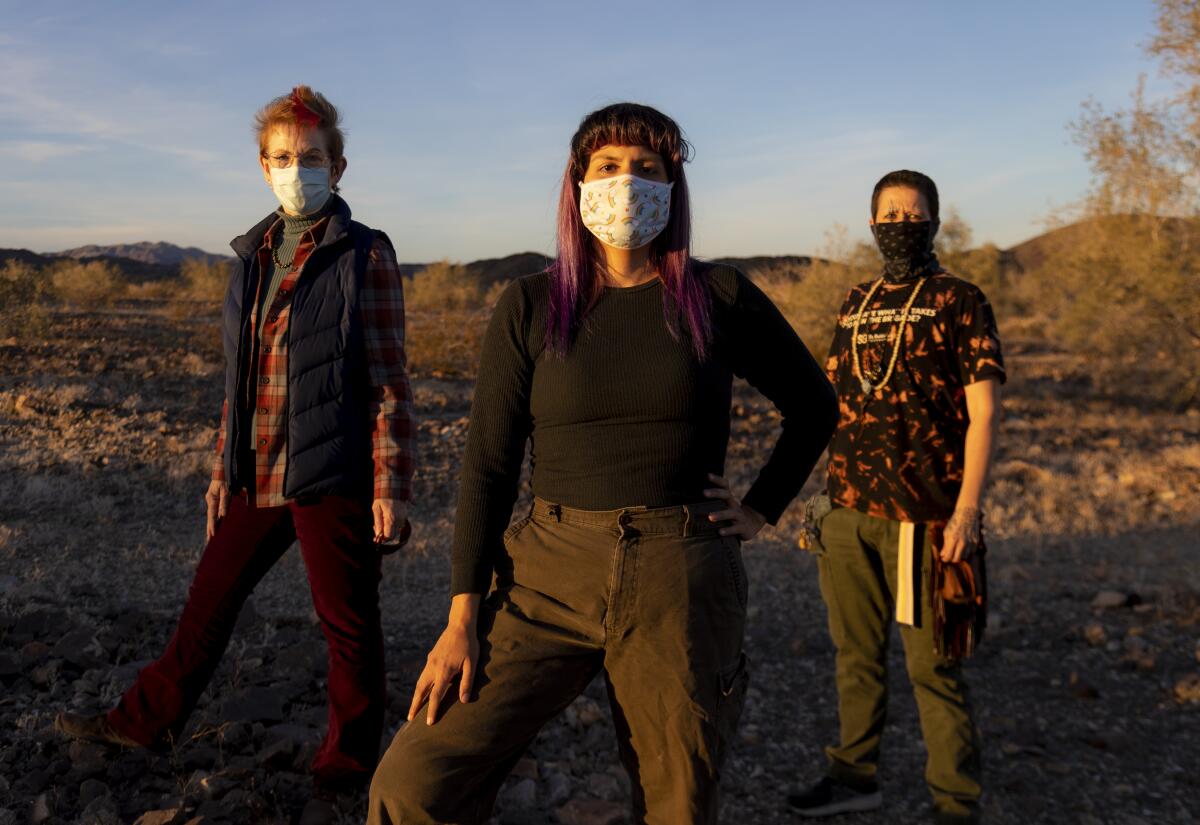
- Share via
Miranda Grow loves the challenge of working with her hands. She’d had experience in carpentry and construction, and fulfilled a career dream when she was accepted as a mechanic apprentice at a large water district, relishing the behind-the-scenes work to deliver clean water to faucets and shower heads across Southern California.
But she said that dream shattered one day on a van ride with a group of co-workers — all men — traveling home from a water treatment plant operated by the Metropolitan Water District of Southern California.
A man in the next row turned to Grow and asked her for a piece of chewing gum. She said he pointed and whispered, “I want the one that’s in your mouth.”
She said she felt his fingers brush across her lips and alleged that an invading hand groped her breast and arm. She froze, feeling trapped with nowhere to escape, she said. The other men didn’t seem to notice what was occurring behind them.
The man Grow accused, Ricardo Montes, denied touching her, according to MWD records reviewed by The Times. An investigation of her complaint backed her claims, and Montes was suspended for 50 hours.
But Grow would not learn of that discipline for years. And in the aftermath of the van incident, it was Grow who ultimately transferred to another worksite to avoid Montes. Years later, Montes would transfer to her new workplace without warning from the agency, prompting her to take a leave of absence.
Grow and other women accuse MWD leadership of tolerating sexual harassment and abuse of women, particularly those in the trades apprenticeship program.
In interviews with 20 current and former staffers and reviews of hundreds of pages of district records, court documents and audio recordings, The Times found a pattern of complaints alleging harassment and bullying of women who enrolled in the apprentice program, which trains workers who operate and repair the water pumping stations and treatment plants of the Colorado River Aqueduct and other district facilities. It is a crucial pathway into higher-paying, skilled jobs.
Only nine of the 218 apprentices hired between 2003 and 2019 were women, according to agency records. Four of them have filed equal employment opportunity complaints with the district, a spokeswoman said.
Overall, 18 women worked in trades positions for the district between 2005 and 2019, records show. Six of those filed formal EEO complaints.
The women said they were ignored or dismissed by agency officials as they complained and pleaded for help. Three said they were pressured to continue working around men they accused of abusive behavior or to seek lower-paying positions.
In one case, a woman was transferred to a facility more than 100 miles from her home, a move that split up her family. Two of her children soon left because there was no high school at the remote desert location.
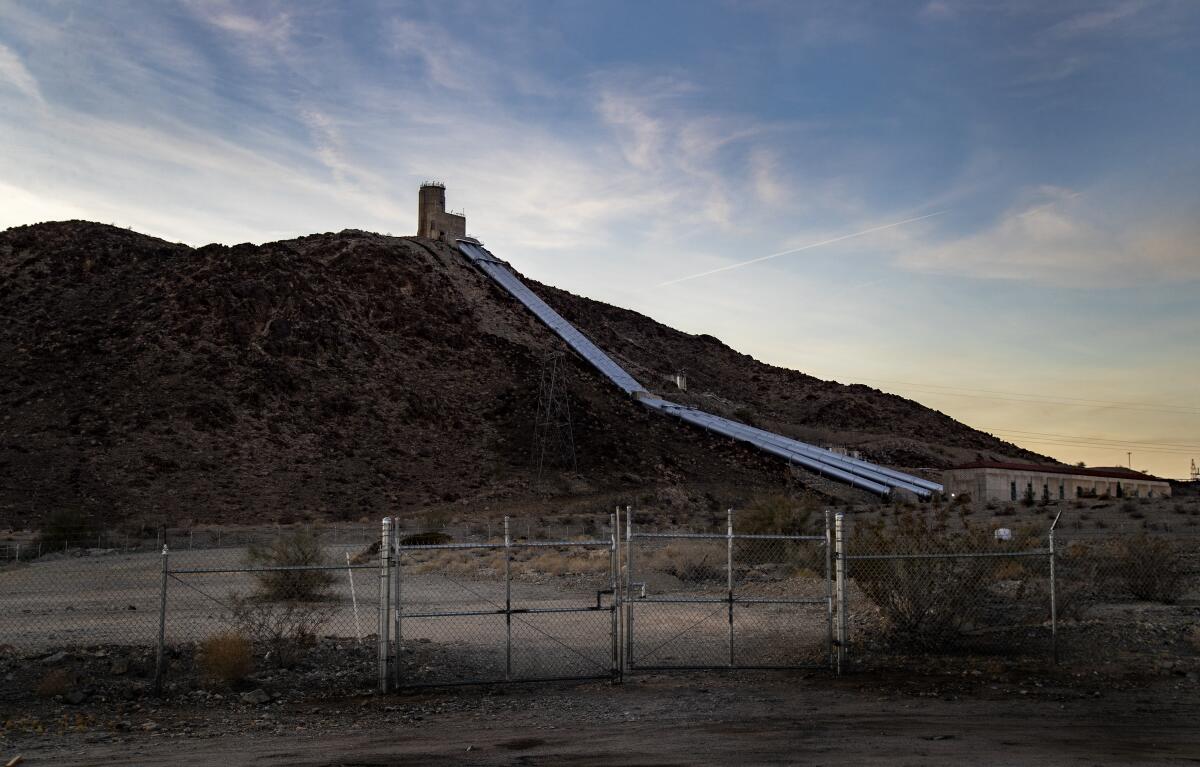
Much of the alleged harassment occurred in areas where housing and worksites are separated by miles of barren landscape. Women described being subjected to unwanted touching, sexual slurs, ridicule for taking “a man’s job” and physical intimidation.
“I endured men who were mad I was there, men who wanted me sexually, men who straight up would not even make eye contact with me ’cause they thought I was so low,” Gina Chavez, 36, a water pump plant mechanic, told the district’s board of directors at a meeting.
Chavez grew up in the desert as a child of an MWD employee. Her father, a retired auto mechanic, made waves when he helped found a Chicano employees association in the 1970s that fought against discrimination. Her children have expressed interest in working for the district, and Chavez said she’s going public so they won’t have to endure similar treatment.
District leaders have promised to thoroughly investigate the MWD’s workplace culture and response to allegations of sexual harassment.
Initially, an outside review was set to report to the MWD’s legal department. However, three board members, all former district employees, questioned its independence, and the investigation will now be overseen by the board directly.
The outside firm will “conduct an independent review of allegations of systemic Equal Employment Opportunity-related discrimination, harassment, and retaliation, and related concerns,” board Chairwoman Gloria Gray said in a statement to The Times.
“Metropolitan takes all allegations of harassment, discrimination, retaliation, and other misconduct very seriously,” the statement said. “That review is proceeding and we await the results.”
Critics have alleged that management and some among the the 38-member board have not moved quickly to address complaints and have retaliated against those who have spoken out. Two of the directors who called for an independent investigation were recently ousted from the board, and Chavez has been notified that she’s under investigation for unspecified allegations, a move she also alleges is retribution for speaking out.
The Times requested interviews with MWD General Manager Jeffrey Kightlinger and the district’s head of human resources, Diane Pitman. The district declined to make them available, instead answering questions by email and without attribution.
“I told him to stop; I told him all the time I don’t like to be touched. Nobody thought it was inappropriate; nobody ever helped me.”
— Lee King, who complained of harassment and intimidation at the MWD
The Metropolitan Water District is known among some officials as the “silent giant”; it’s of vital importance to the Southern California way of life but relatively obscure. With approximately 1,800 employees, the agency operates hydroelectric facilities, reservoirs, water treatment plants and other engineering wonders that carry water 240 miles west from the California-Arizona border and across mountain ranges and deserts to help supply the needs of nearly 19 million people in six counties.
The district’s apprentice program is a gateway to lucrative trades jobs that don’t require a college degree, positions that often pay well over $100,000 a year.
Ariane Hegewisch, senior research fellow for the Institute for Women’s Policy Research in Washington, D.C., said that although sexual harassment in the trades is common, the number of complaints filed by women in the MWD’s apprentice program indicates a serious problem.
“Clearly something is wrong in the workplace,” Hegewisch said.
::
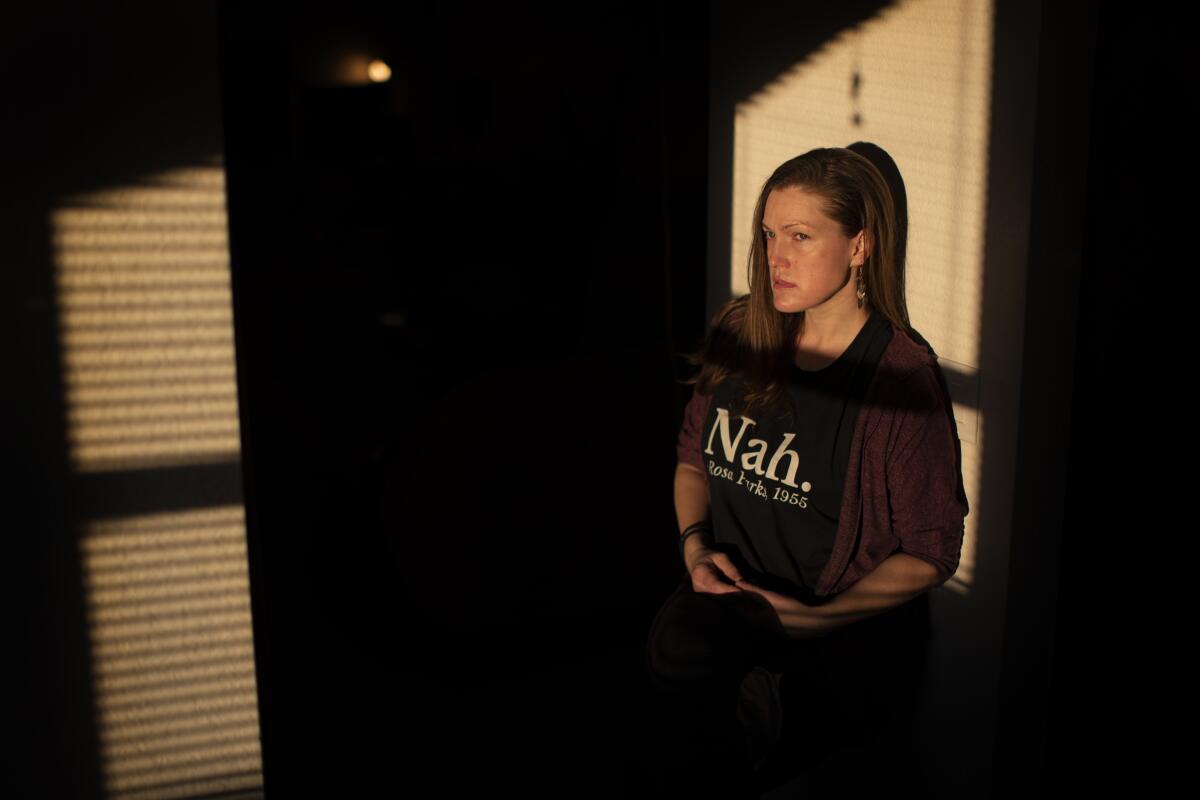
The district’s internal investigation of the 2010 incident involving Grow and Montes concluded that her allegation was true. Cellphone records indicated he was pestering her with frequent phone calls, and he left vague apologies for her in voicemails that pointed to his guilt without explicitly admitting to touching her, documents show.
He was allowed to spread out his 50-hour suspension over several pay periods, according to district records.
Grow, meanwhile, said she was denied a transfer from the Robert B. Diemer facility in Yorba Linda where Montes worked. She continued looking for a way to leave the facility for three years until she applied and was accepted to a position at another treatment plant. But it meant significantly less pay and leaving the apprentice program.
Then, several years later, as she was descending a staircase in the lobby of her new workplace, she came face-to-face with Montes, who abruptly turned away. No one told Grow that he had transferred to her facility, she said.
She passed him again late at night while driving out of the plant’s parking lot. Grow emailed her supervisors that night saying she feared for her safety. The next day, supervisors told her to continue her duties “as required,” emails reviewed by The Times show.
Grow replied that those instructions “put her in harm’s way” and that she was still waiting for someone to address her concerns.
In response to questions from The Times, the water district said “steps were taken to communicate with Ms. Grow” upon receipt of her first email but didn’t elaborate. It also said her concerns were referred to the MWD security staff.
Montes could not be reached for comment. A woman at his home shut the door on a Times reporter who requested to speak with him.
Ultimately, Montes’ presence and what Grow said was bullying behavior from co-workers became too much to bear, and Grow walked off the job several months ago, she said. She’s since been on voluntary administrative leave.
“It was always me who got displaced,” Grow, 36, said. “They’ve never moved him from me.”
Asked about Montes’ transfer, the MWD said the human resources staffers who approved it were not aware of “any investigation or personnel action that could impact the transfer request.” The district said managers at the plant where Grow was stationed were kept in the dark about Montes’ history because “all investigations are confidential to the fullest extent possible.”
In an Oct. 20 email to staffers after Grow told her story at a board meeting, Kightlinger said her 2010 complaint was handled “appropriately” but didn’t address her recent complaints about being pressured into working at the same facility as Montes. Grow said she viewed Kightlinger’s email as inadequate and retaliation for speaking out.
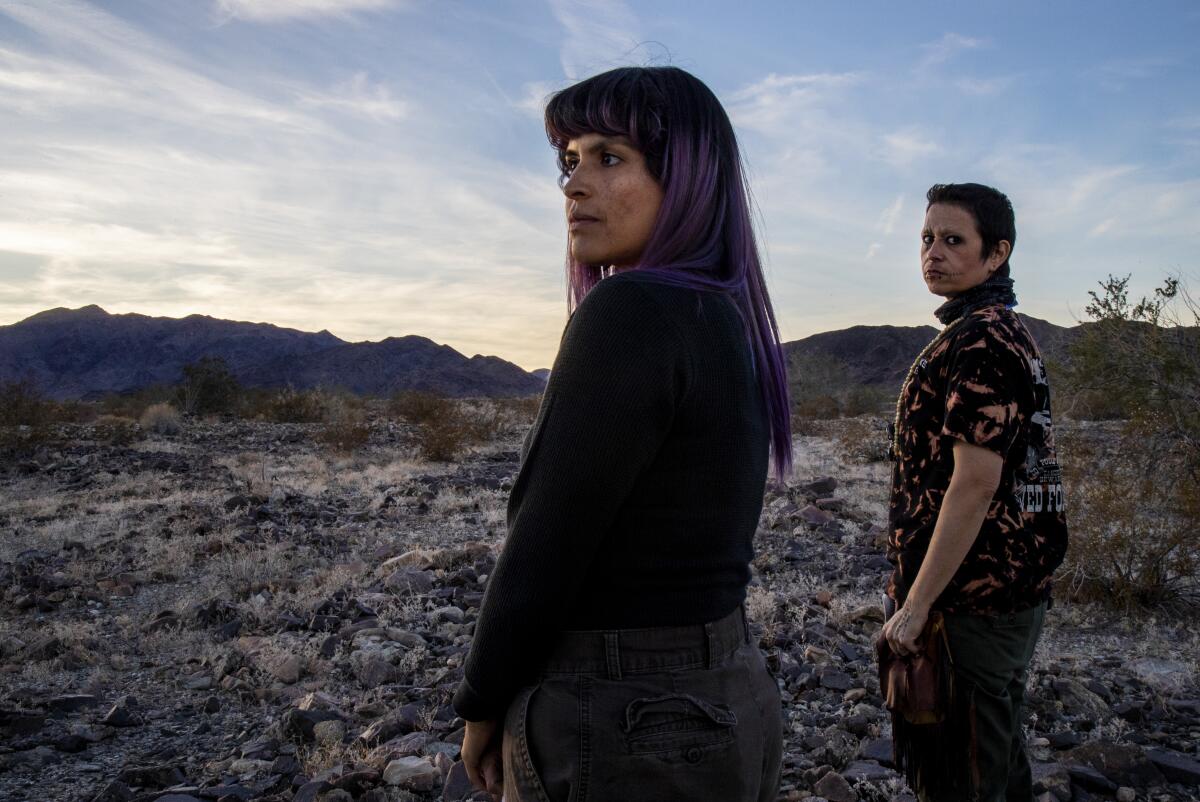
When Chavez and Lee King became among the first tradeswomen in the desert, they described the world they entered as a highly sexualized environment where women were harassed without consequence.
Employees say it is a hardscrabble culture. Managers treat the camps as “colonial possessions” because they are “out of sight and out of mind,” said Ellen Mackey, a longtime ecologist with the district.
King, then 19, became an electrician apprentice in 2005 and was stationed at the Iron Mountain plant, an outpost between Lake Havasu and Joshua Tree National Park. King, who grew up in the desert as the daughter of district employees, is transgender but at the time identified as a woman.
Men regularly spammed everyone’s email boxes with pornography, King said. Rape jokes were used in training, and equipment was referred to using derogatory terms for lesbians and pubic hair. One mnemonic to remember the resistance value of differently colored electrical wires went, “Bad boys rape our young girls but Violet goes willingly,” King and Chavez said in interviews with The Times.
The journeyman first assigned as a mentor scolded King for taking what he considered a man’s job and preventing a man from being able to provide for his family, King said.
The same journeyman made King walk in front of him and frequently touched King’s back and shoulders, King said.
“I told him to stop; I told him all the time I don’t like to be touched,” King said. “Nobody thought it was inappropriate; nobody ever helped me. I was alone.”
Despite requests, King’s union never filed a grievance or EEO complaint, King said.
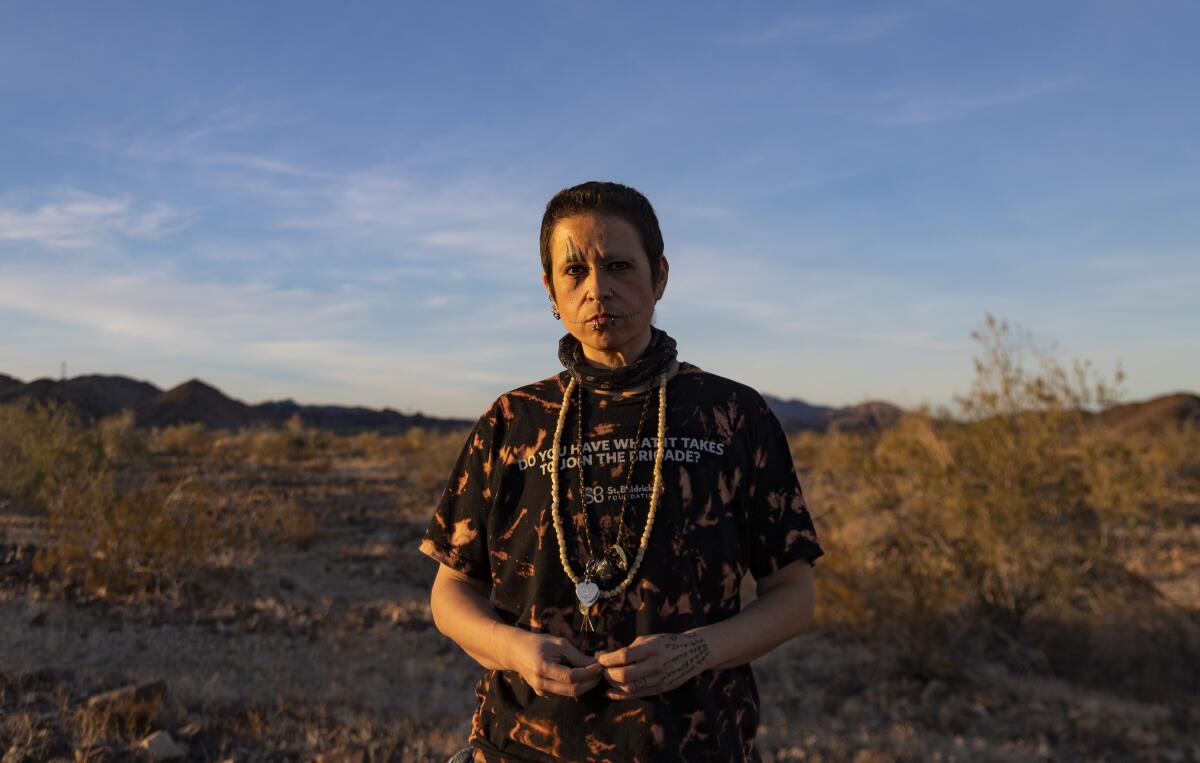
After becoming pregnant, King tried to negotiate a less strenuous work detail in the same job but reluctantly accepted a lower-paying administrative position at Gene Camp near Lake Havasu.
In 2018, King wrote a nine-page letter to the district’s board of directors, recounting being touched inappropriately and forced into a long daily commute that no male apprentice had to take. In the letter reviewed by The Times, King pleaded for help and warned that the desert camps were rife with sexism and run by a hard-partying manager who intimidated employees.
Meanwhile, King said, the harassment continued, including on one occasion in 2019 when a manager made a sexually suggestive comment, King alleged in an EEO complaint.
King filed the EEO complaint about the incident with the help of Chavez, King’s new union representative. The human resources department in a letter said it found the supervisor, Hector Enriquez, was present in King’s office, but it did not substantiate the sexual innuendo allegation, according to a copy of the letter reviewed by The Times.
Reached by The Times, Enriquez said he didn’t have time to speak and hung up the phone. He didn’t respond to follow-up messages.
In April 2020, an investigator met with King and a union representative to discuss King’s 2018 letter, and after that, King decided not to cooperate, the water district said in an email to The Times.
King and the union representative, Jeffrey Froehlich, dispute the district’s contention. King said there was no contact about the letter and no refusal to cooperate. Froehlich said he told the district that he was caught off guard after waiting so long for a response to King’s letter. He told the investigator King needed time to prepare for an interview.
“Why is this coming across my desk now almost two years later?” Froehlich asked.
The district said the letter was “referred for investigation” to an outside law firm in February 2019. The law firm decided to first investigate a number of individual complaints and to delay looking into allegations of “systemic discrimination” raised in King’s letter, the district said.
King, Chavez and other employees said they were particularly alarmed by the behavior of unit manager Donald Nash, an MWD veteran who had a reputation for erratic behavior and flying into angry outbursts, especially around women.
District manager Jolene Fuentes filed a civil lawsuit in May 2019 alleging that Nash subjected to her to “unwanted sexual slurs, epithets and commenting on her Victoria Secret perfume,” and texted her repeatedly to have drinks with him.
In a complaint filed earlier that year with the state Department of Fair Employment and Housing, Fuentes said Nash physically intimidated her and harassed her between 2015 and 2018. She complained to district management, which failed to remedy the situation, according to the complaint.
The documents say Fuentes sought and accepted a lower-paying job at another facility to get away from Nash, only to then be harassed by her supervisor at that location. She took a stress leave of absence and sought medical treatment as a result, she wrote.
As part of its legal settlement, the district agreed to provide her back pay to cover the difference in compensation, according to a copy of the settlement agreement obtained by The Times.
Reached by The Times, Fuentes declined to comment, citing a nondisparagement clause in the settlement agreement.
The district launched an investigation of misconduct allegations against Nash and notified him in May 2019 that he would be fired.
In July, Nash, 52, shot and killed himself in the camp near Lake Havasu.
Grow, King and Chavez said the culture in which Nash thrived extended to every workplace where they were stationed.
Chavez said she was made to fetch food and coffee for the men on the first day of her apprenticeship, which no male apprentices were required to do.
She said Enriquez, her supervisor at the time, scolded her for getting pregnant close to her graduation from the apprentice program.
When she was eight months pregnant, she alleges, the same manager assigned her to work in a tin shed where the temperature was 115 degrees, with no air conditioning. She complained to him but said she was told she would have to take time off because other light-duty jobs were occupied by men who had injuries or were too old for heavy lifting.
The conditions prompted her doctor to write a note that described Chavez as “tough” and “determined” but said the stress of working with her supervisor threatened her health, according to the note reviewed by The Times.
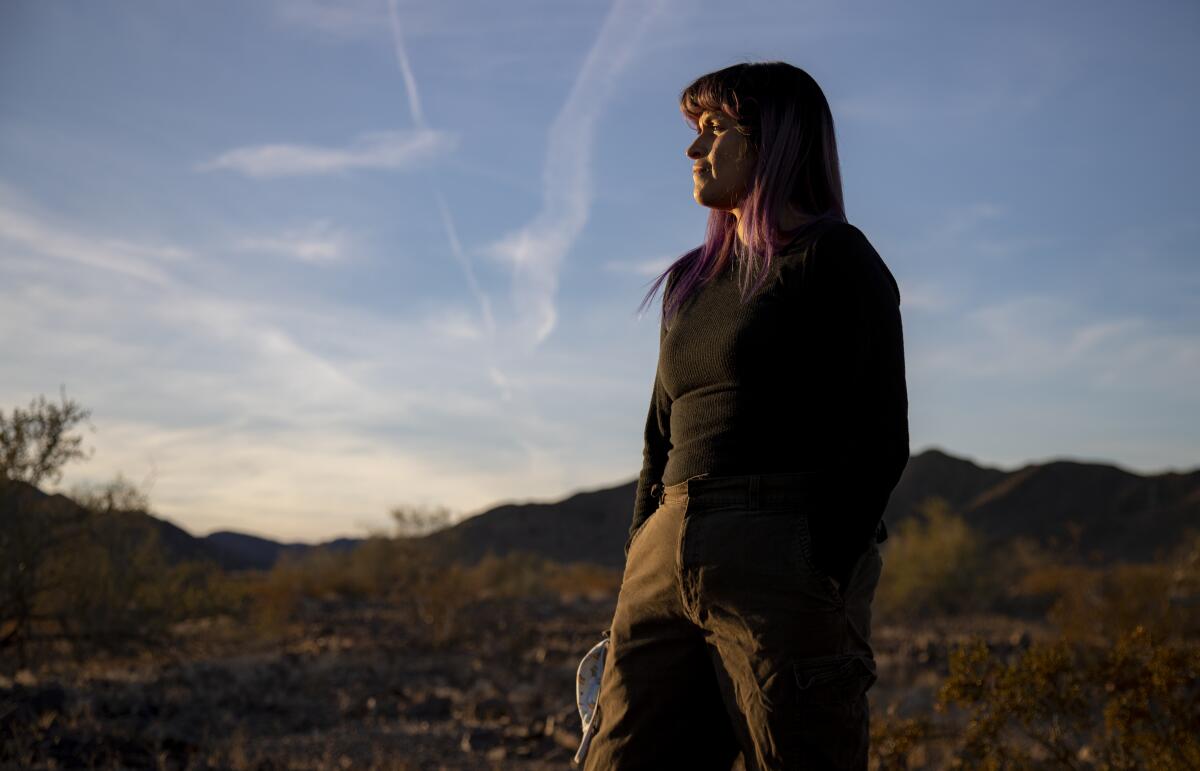
Chavez filed an EEO complaint, which was reviewed by The Times, and the district’s solution was to move her to the Eagle Mountain pumping plant, a facility so isolated the nearest grocery store was more than an hour away.
Eventually, her two older children moved back in with her husband near the Arizona border, where she was previously stationed, because Eagle Mountain had no high school.
She transferred in 2013, and she’s been “trying to get home ever since,” she said.
In 2018, the district asked her to participate in a promotional video for the apprentice program, hoping to attract more female recruits.
The video featured Chavez playing soccer with her children and promoting the MWD as a place where she’s been able to live at the worksite with her family.
Chavez said she justified her role in the video by telling herself that increasing the ranks of women would lessen her sense of solitude.
But she also felt guilty, saying, “I just felt so false.”
Chavez, King and Grow formed a women’s caucus of their union with Mackey to demand that the district hold managers and human resources officials accountable for allowing harassment and other misconduct to fester.
They allege that the human resources department often doesn’t thoroughly investigate claims. One complaint Chavez filed against her former supervisor, alleging that he cornered her and commented on her looks, was dismissed as lacking evidence, Chavez said.
Later, an investigator hired by the human resources department acknowledged that Chavez’s primary witness, who was present during the confrontation, wasn’t interviewed, a recording of a phone call she made with the permission of the investigator showed.
The district said a subsequent interview with that witness did not change the findings.
Chavez, who has been outspoken at board meetings about her experience, was on voluntary administrative leave pending an investigation into concerns she raised that a male co-worker posed a physical danger to her. The district notified Chavez on Feb. 3 that the man was deemed a low risk and, the same day, notified her that she would remain on administrative leave because she is under investigation for potential misconduct. The letter, reviewed by The Times, did not provide details.
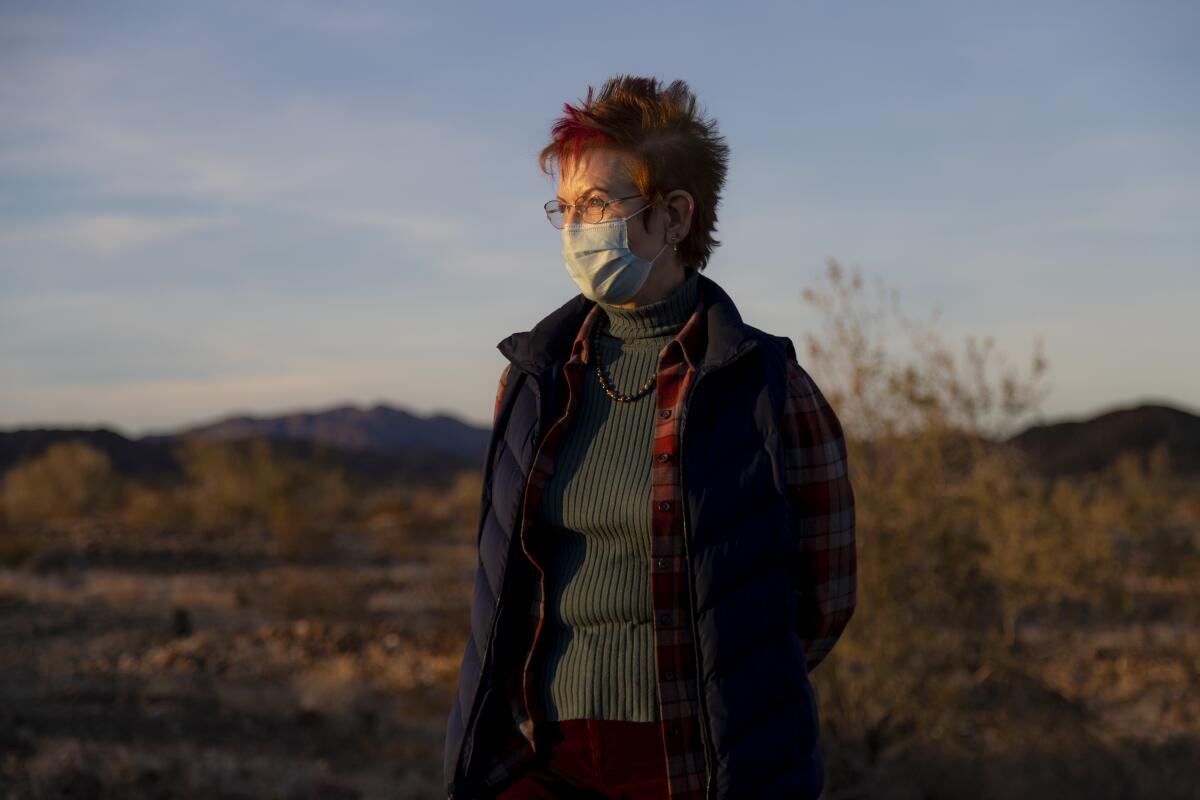
The Metropolitan Water District is made up of 26 member agencies and cities, with board directors who represent the various entities. In late January, the Upper San Gabriel Valley Municipal Water District’s board of directors in a 3-2 vote decided to replace Charles Treviño, one of three directors to call for an independent investigation, as its representative.
Upper San Gabriel Valley board members did not return calls from The Times seeking comment.
On Feb. 2, the Fullerton City Council voted to remove its representative to the MWD board, Adán Ortega, who had also pushed for the independent investigation into sexual harassment complaints.
All three directors who called for an investigation to report to the board — Treviño, Ortega and San Fernando Mayor Sylvia Ballin — allege the removals are retaliation for their request.
“These actions encourage a culture of fear and retribution,” Ballin told the Fullerton council during the meeting.
Fullerton Mayor Bruce Whitaker, who supported Ortega’s removal, said he preferred that the MWD representative be a council member accountable to the voters. He acknowledged that the timing of the removal was “unfortunate” and could be interpreted as retaliation, but he denied that was the case, at least for his vote.

Although Grow, King and Chavez shattered gender barriers, they said their achievements came at a high price. Grow said she spent hours of unpaid time gathering evidence for her complaint, but the district refused to tell her what discipline, if any, Montes faced.
Only recently a Times reporter informed her of Montes’ suspension, which she said was woefully inadequate.
“There’s nothing in it for you to file an EEO complaint, except a chance to have your dignity,” Grow said. “And it’s a long shot.”
More to Read
Sign up for Essential California
The most important California stories and recommendations in your inbox every morning.
You may occasionally receive promotional content from the Los Angeles Times.











